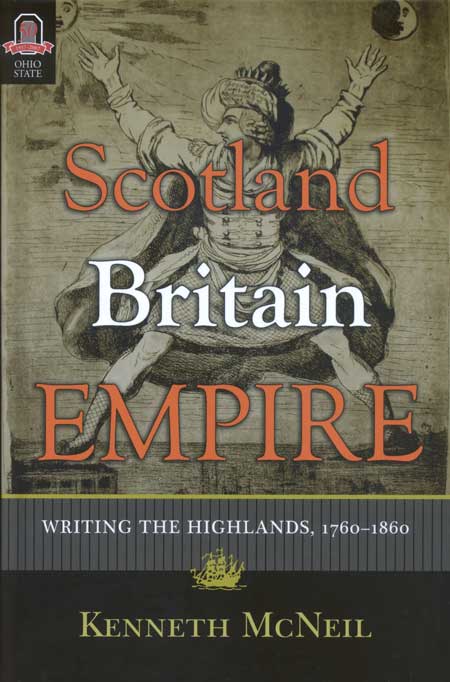click here to read excerpts from the book
 Scotland, Britain, Empire
Scotland, Britain, Empire
Writing the Highlands, 1760–1860
Kenneth McNeil
“[T]his well-written study . . . obliges one to rethink early literary representations of Scotland.” —Choice
“Kenneth McNeil is an able guide to the shifting representations of the Scottish Highlands during the period of their transformation from blighted breeding ground of treasonous rebellion to privileged locus of sentiment and sociability. [He provides] a crucial window for viewing how Britons of this period saw themselves, as well as how they saw their Highland subjects.” —European Romantic Review
“McNeil makes expert use of postcolonial theory to analyze the overlapping relationships between Highlands and Lowlands, Scotland and England, and Britain and its overseas empire . . . . employing sophisticated theoretical and historical frameworks to explain how we have overlooked the central importance of Scotland’s Celtic periphery to our understandings of the eighteenth century.” —Eighteenth-Century Life
“interesting reflections on, firstly, the different ways in which the experience of empire worked to blend notions of Scottish and British identity in the nineteenth century and, secondly, the place of the Highland soldier in constructions of Victorian masculinity and narratives of war.” —H-Net Reviews
“Scotland, Britain, Empire is extremely well researched, leaving few stones unturned in its search for relevant texts. Kenneth McNeil’s study brings to recent Scottish studies a broad range of conceptual frames, many of which have been under-explored in previous studies of Scotland and the Highlands.” —Janet Sorensen, author of The Grammar of Empire in Eighteenth-Century British Writing
Scotland, Britain, Empire takes on a cliché that permeates writing from and about the literature of the Scottish Highlands. Popular and influential in its time, this literature fell into disrepute for circulating a distorted and deforming myth that aided in Scotland’s marginalization by consigning Scottish culture into the past while drawing a mist over harsher realities.
Kenneth McNeil invokes recent work in postcolonial studies to show how British writers of the Romantic period were actually shaping a more complex national and imperial consciousness. He discusses canonical works—the works of James Macpherson and Sir Walter Scott—and noncanonical and nonliterary works—particularly in the fields of historiography, anthropology, and sociology. This book calls for a rethinking of the “romanticization” of the Highlands and shows that Scottish writing on the Highlands reflects the unique circumstances of a culture simultaneously feeling the weight of imperial “anglobalization” while playing a vital role in its inception.
While writers from both sides of the Highland line looked to the traditions, language, and landscape of the Highlands to define their national character, the Highlands were deemed the space of the primitive—like other spaces around the globe brought under imperial sway. But this concern with the value and fate of indigenousness was in fact a turn to the modern.
Kenneth McNeil is associate professor of English at Eastern Connecticut State University.
|
Mar 2007 Literary criticism/Scottish, British 228 pp. 6x9 |
|
| $64.95 cloth 978-0-8142-1047-5 | Add cloth to shopping cart |
| $14.95 CD 978-0-8142-9127-6 | Add CD to shopping cart |


